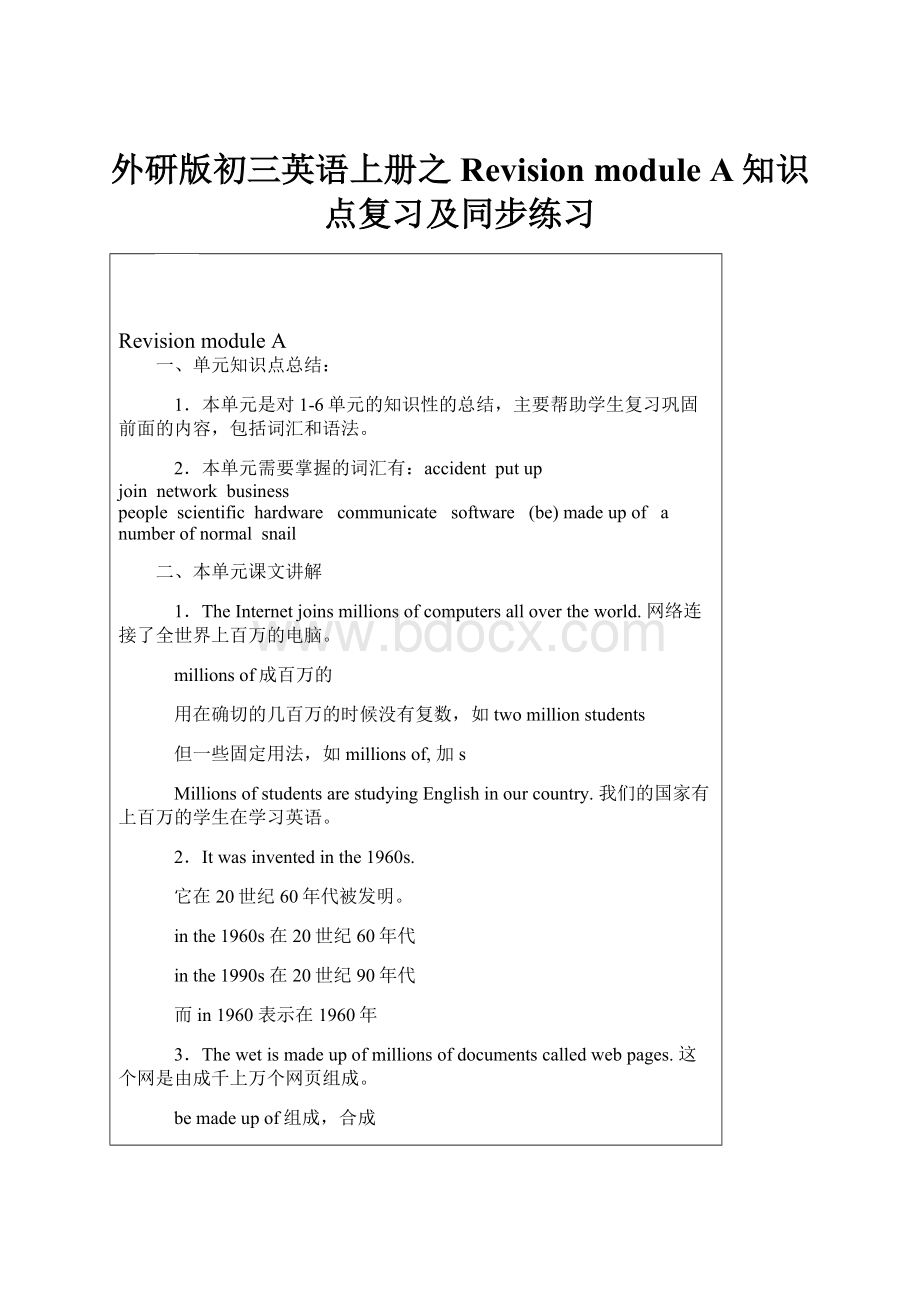外研版初三英语上册之Revision module A知识点复习及同步练习.docx
《外研版初三英语上册之Revision module A知识点复习及同步练习.docx》由会员分享,可在线阅读,更多相关《外研版初三英语上册之Revision module A知识点复习及同步练习.docx(10页珍藏版)》请在冰豆网上搜索。

外研版初三英语上册之RevisionmoduleA知识点复习及同步练习
RevisionmoduleA
一、单元知识点总结:
1.本单元是对1-6单元的知识性的总结,主要帮助学生复习巩固前面的内容,包括词汇和语法。
2.本单元需要掌握的词汇有:
accident putupjoin network businesspeople scientific hardware communicate software (be)madeupof anumberofnormal snail
二、本单元课文讲解
1.TheInternetjoinsmillionsofcomputersallovertheworld.网络连接了全世界上百万的电脑。
millionsof成百万的
用在确切的几百万的时候没有复数,如twomillionstudents
但一些固定用法,如millionsof,加s
MillionsofstudentsarestudyingEnglishinourcountry.我们的国家有上百万的学生在学习英语。
2.Itwasinventedinthe1960s.
它在20世纪60年代被发明。
inthe1960s在20世纪60年代
inthe1990s在20世纪90年代
而in1960表示在1960年
3.Thewetismadeupofmillionsofdocumentscalledwebpages.这个网是由成千上万个网页组成。
bemadeupof组成,合成
Themedicalteamismadeupoftwodoctorsandfournurses.这个医疗小组由2个医生和4个护士组成。
另外bemadeof和bemadefrom都是“用……制成”的意思,介词of和from都可以表示一件制成的东西所用的原材料,但两者在用法上是有区别的。
bemadeof表示制成成品后,仍可看出原材料是什么,保留原材料的质或形状,制作过程仅发生了物理变化。
bemadefrom表示制成的东西完全失去了原材料的外形或特性,或原料在制作过程中发生了化学变化,在成品中已无从辨认。
试比较:
①Thedesksandchairsaremadeofwood.这些课桌椅是木材制成的。
②Theinkbottlesaremadeofglass.墨水瓶是玻璃制成的。
③Saltismadefromseawater.盐是用海水制成的。
④Thiskindofwineismadefromwheat.这种酒是用小麦制成的。
⑤Booksaremadeofpaperandpaperismadefromwood.书是纸制成的,而纸是用木材制成的。
4.thenumberof和anumberof的区别
anumberof意为“许多、”“一些”,后接复数的可数名词。
有alarge/great/smallnumberof等词组。
anumberof+n.(复)作主语时,谓语动词要用复数。
这两个词组后都接可数名词复数,但anumberof的中心是后面的复数名词,作主语时,谓语用复数形式。
①Icanthinkofanumberofwaystocarryoutthisplan.我可以想出不止一个办法来实现这个方案。
②Alargenumberofpeoplewerepresentatthemeeting.有许多人出席了会议。
③Anumberofstudentsarestayingoutsidetheoffice.许多学生站在办公室的外面。
thenumberof意为“……的数目”,它的中心是thenumber,后也接复数的可数名词,作主语时,谓语动词要用单数。
举例如下:
①Thenumberofthestudentsstandingoutsideisabouttwenty.站在外面的学生数量大约是20个。
②Thenumberofthebooksinourlibraryisabout45,000.我们图书馆藏书量大约为4万5千册。
二、语法:
构词法
(1)合成词:
由两个或者更多独立的单词组合成一个单词。
合成词的形式有如下原则和方法:
1)名词+名词=名词
birthday 生日 raincoat 雨衣
2)形容词+名词=形容词
wildlife 野生的
3)形容词+名词+ed=形容词
kind-hearted 好心的 warm-hearted 热心的
4)数字+名词(计量单位词)+形容词=形容词
6-year-old 6岁的 2-foot-deep 2英尺深
(2)派生词
1)前缀
①表示否定的前缀:
dis-,un-,im-,non-等。
如:
disobey违背 unfair不公平的 impossible不可能的 non-stop不停留的
②前缀re-附在动词之前,表示“重复”,“再做”的意思。
如:
rewrite 重写,改写 retell 复述
2)后缀
①后缀-er或-or,这类词构成做某种事情的人或工具、器皿等的总称。
如:
cleaner 清洁工 visitor 来访者
②后缀-ist,通常指在某方面有特长的人。
如:
scientist 科学家 artist 艺术家
③后缀-ion,-ment,加此后缀后,动词转变为抽象名词或集体名词。
如:
invention 发明 movement 运动
④后缀-ness,-ty,加此后缀后,形容词构成抽象名词,表性质、状态、程度等。
如:
busy→business 生意 ill→illness 疾病 safe→safety 安全
⑤后缀-able,此后缀附在动词或名词后面,表示“可……的”,“能……的”,构成形容词。
如:
enjoyable 愉快的 reasonable 合乎情理的
⑥后缀-ful,-less,后缀-ful加在名词后面表示“充满……”,“有……性质”,“有……倾向”,构成形容词。
很多可以加后缀-ful的词也可以加另一个后缀-less,表示“无……”,“没有……”等。
如:
care—careful 仔细的 care—careless 粗心的 home—homeless 无家可归的
⑦后缀-ous,该后缀多用在抽象名词的后面构成形容词,表示“具有……的”、“有……特性的”或者“多……的”。
如:
dangerous 危险的 famous 著名的
⑧名词+后缀-y构成形容词,表示“有……的”、“多……的”。
如:
dirty 脏的 windy 有风的 rainy 下雨的
⑨名词+后缀-ish构成形容词,表示“……似的”,“稍带有……的”。
如:
foolish 傻的、笨的
⑩形容词+后缀-ly构成副词。
如:
badly 坏地、恶劣地 easily 容易地
⑾动词+后缀-ing构成形容词。
如:
exciting 令人兴奋的 interesting 有趣的
⑿动词+后缀ed构成形容词
excited对……兴奋 interested对……感兴趣
三、练习
Ⅰ、单项选择
1.Noonecanbesure____inthefuture.
A.whatmanlookslike B.whatwillmanlooklike
C.manwilllooklikewhat D.whatmanwilllooklike
2.Iheardsomethingstrangeoutside.ButIcouldfind_____.
A.something B.anything C.nothing D.athing
3.Thebedroom____cleanandtidy.
A.mustkeep B.mustbekept C.arekept D.kept
4.He____gointothelibrary.
A.wasseen B.wasseento C.sawto D.wassawto
5.ImetMrLi____Iwaswalkingacrossthebridge,butIdidn'tsayhellotohim.
A.while B.after C.until D.before
6.Couldyoupleasetellmehowsoon______?
A.isyourbrotherbackfromhometown
B.yourbrotherisbackfromhometown
C.willyourbrotherbebackfromhometown
D.yourbrotherwillbebackfromhishometown
7.—Doyouknow____LiuXiangcametoNanjing?
—Yes,Ido.Hecamebyplane.
A.why B.where C.what D.how
8.Anelephantis_____thanatiger.
A.heavy B.veryheavy C.heavier D.theheaviest
9.Bettywithherparents____goingtovisittheGreatWallthissummerholiday.
A.are B.is C.was D.were
10.Iwanttoknow_____.
A.whendotheyfinishthework B.whenwilltheyfinishthework
C.whentheywillfinishthework D.whentheydofinishthework
Ⅱ、完形填空
OnedayBobtooktwoofhisfriendsintothemountains.They 1 theirtentsandthenrodeofftoaforesttoseehowthetreesweregrowing.
Intheafternoonwhentheywereaboutten 2 fromtheircamp.Itstartedtosnow.Moreand 3 snowfell.SoonBobcouldhardlyseehishands 4 hisface.Hecouldnotfindtheroad.Bobknewthereweretworoads. 5 roadwenttothecamp,andtheotherwenttohishouse.Butallwaswhitesnow.Everythingwasthesame.Howcouldhetakehisfriends 6 tothecamp?
Bobandanidea.Thehorses!
Letthehorsestakethemback!
Butwhatwouldhappen 7 thehorsestooktheroadtohishouse?
Thatwouldbeatripofthirty-fivekilometers 8 suchcoldweather!
Itwasgetting 9 .Theyrodeonandon.Atlastthehorsesstopped.Wherewerethey?
10 ofthemcouldtell.Johnlookedaround.Whatwasthatunderthetree?
Itwasoneoftheirtents!
1.A.putup B.puton C.putoff D.putin
2.A.metres B.feets C.inches D.kilometres
3.A.less B.more C.much D.fewer
4.A.ago B.before C.after D.behind
5.A.One B.The C.A D.No
6.A.front B.after C.back D.off
7.A.if B.because C.and D.since
8.A.on B.at C.of D.in
9.A.early B.sunny C.late D.warm
10.A.One B.Two C.None D.All
Ⅲ、补全对话
A.Theydiscussedourideastotheschoolboard.
B.Likewhat?
C.It'snotuseful.
D.butIwanttojoinit.
E.andIthinkitisagoodthing.
F.butIstilldon'twanttojointheParty.
G.Thankyou.
A:
Areyougoingtothemeetingtonight?
B:
No,Irefusedtojoinaparty.
(1)
A:
Iusedtothinkthatway,butnotanymore.ThePartyisheretostay,______
(2)
A:
(3)
B:
Theyaskedtogetmoremoneyandlighterworkplace.
A:
Theyworkedtogetbetterlearningenvironmentforourstudents.
B:
(4)
A:
Theywantedtocontrolclasssizeandoffermorelessons.
B:
yes,theywerehelpfulinthosecases, (5)
Ⅳ、阅读理解
A
Theworldisnotonlyhungry,itwillalsobethirstyforwater.About97%ofwaterontheearthisseawater,orsaltwater.Mancanonlydrinkorusetheother3%ofthefreshwaterwhichcomesfromrivers,lakesandunderground.Ontheotherhand,becausethenumberofpeopleintheworldisbecominglargerandlarger,moreandmorefreshwaterisneeded.Sowatershortagebecomesabigproblem.
Howcanweworkoutthisproblem?
Scientistshavefoundsomewaystoturnsaltwaterintofreshwater.Oneimportantwayistoboil(使达到沸点)seawaterwithhighheatuntilvapor(蒸汽)rises,leavingthesalt.Inthisway,alotoffreshwatercanbemadequickly.
Butheatingisnottheonlywaytogetfreshwater.Otherwaysaretried,forexample,diggingdeepwells,keepingrainwaterandpreventingriversfrombeingpolluted.
Whichwayisthebest?
Togetthemostfreshwaterfortheleastmoneyisthebest.
根据短文内容,判断正(T)误(F)。
( )1.Thefreshwateriswantedontheearth.
( )2.Mancandrinkallkindsofwater.
( )3.Theseawaterisbecomingless.
( )4.Wecangetfreshwaterfromseawaterinsomeways.
( )5.Wearetryingtofindthewaytospendleastmoneygettingmostfreshwater.
B
“NextThursdayisgoingtobeaholiday,”saystheteacher.“Iwantyoutotellmewhatyouaregoingtodo,Jane.”“I'mgoingtothecinematoseeafilm,”saysJane.“It'sanEnglishfilmaboutthelifeoftheworkersinAmerica.Myclassmatessayit'sagoodfilm.”
“Besides(除了)seeingfilm,whatareyougoingtodo?
”theteacherwantstoknowmore.
“OfcourseI'mgoingtodomylessons.Inthemorning,I'mgoingtostudyEnglishandphysics.”
“Doyoulikethem?
”theteacherasks.
“Theylookeasy,buttheyarenoteasyforme.Ilikethemverymuch,I'mgoingtodomybesttoworkhardatthem.”
“Whatareyougoingtodointheafternoon?
”askstheteacher.
“Afterlunch,I'mgoingtoplayvolleyballwithsomeofmyclassmates.ThisSeptember,wearegoingtohaveamatchwithClassOne.”
“Yes,”saystheteacher.“Ihearyouaregoodatit.”
6.WhoasksJanetotellhimwhatsheisgoingtodointheholiday?
A.Themother. B.Theclassmate. C.Thefather. D.Theteacher.
7.What'sthefilmabout?
A.It'saboutthelifeoftheworkersinAmerica.
B.TheChinesefilmisaboutthelifeoftheworkersinAmerica.
C.TheEnglishfilmisaboutthestudyoftheworkersinAmerica.
D.TheEnglishfilmisaboutthelifeofthestudentsinAmerica.
8.Inthemorning,what'sJanegoingtodo?
A.SheisgoingtohaveP.E.
B.SheisgoingtostudyphysicsandEnglish.
C.SheisgoingtohavematchwithClassTwo.
D.Sheisgoingtohelpherclassmates.
9.WhataretheygoingtodoinSeptember?
A.They'rego